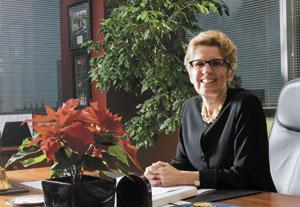“Do I see the world the same way as Mayor Ford? Absolutely not,” Kathleen Wynne says with a subtle laugh, “but that doesn’t mean we can’t work together.”
That search for compromise seems to be the main marker of Wynne’s first few months as minister of municipal affairs and housing and aboriginal affairs, where her party’s social agenda has clashed with the slash-and-burn approach to social services and the public realm favoured by the Ford administration at Toronto’s City Hall.
But Wynne is no stranger to opposition. Through electoral campaigns where opponents labelled her an “extremist lesbian,” to being pitted against Progressive Conservative leader John Tory, to the 2011 campaign in which the PC candidate in a neighbouring riding sounded alarms over her “radical agenda,” Wynne has maintained a dignified poise that has earned her the respect of voters and the opportunity to cooperate with potential opponents when in power.
Despite her obvious differences of opinion with Toronto’s mayor, as minister of transportation last year she was able to renegotiate an $8-billion transit plan that scrapped four planned light-rail transit lines spanning the city’s inner suburbs in favour of a new plan that put a truncated LRT line completely underground along Eglinton Ave and allowed the mayor a free hand to explore options to build a subway along Sheppard Ave without provincial money.
The negotiated agreement allowed both the McGuinty Liberals and Ford to claim victory on the file, but it appears to have also given opponents of the mayor’s plan time to organize support for reviving the original plan.
“We were in a situation that the municipal election had just happened, the mayor had run on a very clear mandate to make some changes to the transit plan that was in place, and I felt that it was my responsibility to work with him,” Wynne says. “I have a deep respect for the autonomy of municipal governments. One of the reasons that I got involved in politics was because of the disrespect the previous government showed municipalities.”
Wynne says that a political career wasn’t a lifelong plan, but her involvement in public life goes back to her high school days, when she served on her Richmond Hill high school’s student council. Over the years, she’s also found herself working as an activist and organizer both for her local North Toronto community and for the queer community.
She served as a board member for Ontario’s LGBT Youth Line and speaks fondly about the fundraisers she used to help organize for it, including the lesbian MAD for Dancing parties.
“Women used to come from all over for that. There wasn’t anything else for them at the time,” she says. “We raised more than $50,000.”
Wynne came out as a lesbian at age 37, after 13 years of marriage to a man with whom she has three children, now aged 31, 30 and 27.
“We went through a transition,” she says. “It was a tumultuous time, but I think it was done in a way that we’ve been able to retain those relationships.
“We co-parented. We [Wynne and her partner, Jane] had a house in North Toronto, and my ex-husband lived in a house with an adjoining garden. So the kids were back and forth between the two houses.”
When Wynne’s children were school-aged, she started getting involved in parent-teacher associations and sought election as a school trustee. She was defeated in 1994 but ran again in 2000 and won, after a tumultuous campaign in which opponents first gave her the “extremist lesbian” label.
“I laugh, because I think that kind of hate mongering is just so counterproductive,” she says. “I have led a pretty traditional life, even though I have some impatience about some of our social structures. I think that the best thing I can do in the face of that is to confront it, to be as open as I can, to empower other people to be open.”
Wynne was first elected to the Ontario legislature in 2003. After stints in education and transport, she is now tasked with maintaining her government’s agenda in the face of pressures from conservative municipal governments and from the province’s swelling budget deficit.
“The most important thing we can do as a provincial government is stay true to our principles and to continue to work with municipalities to provide the resources that we think are important,” she says. “When a young mom goes into a community centre to take her young toddler for a swimming lesson, it’s not really important to her who provides the funding; what’s important is that the pool is clean and safe and there is a swim instructor there and that those services are available. It’s my hope that all municipal leaders will pay close attention to the needs of their communities.”
With the upcoming Drummond report rumoured to recommend cuts as deep as 30 percent from all ministries except health and education, Wynne’s job could soon include fighting to save those very services.
“Those programs need to stay in place. We’re going to fight tooth and nail for them, and because they’re interjurisdictional, they’re critical to communities,” she says. “The reality is that we had an economic downturn and there are going to have to be some changes that we make. I can’t predict what those will be at this point.”
With these challenges ahead of her, Wynne doesn’t see herself leaving public life anytime soon. “I’m going to work as long as I’m making a contribution,” she says.


 Why you can trust Xtra
Why you can trust Xtra


